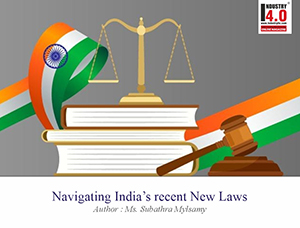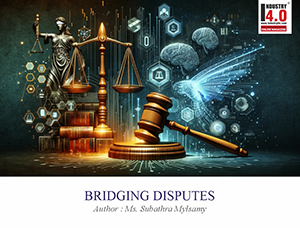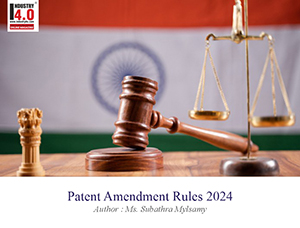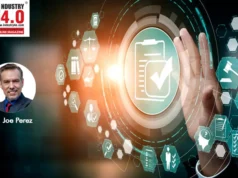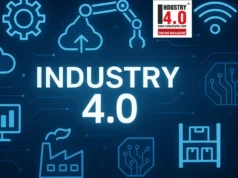From Broadcast to Broadband: The Reach of the
Broadcasting Services (Regulation) Bill, 2024
The Broadcasting Services (Regulation) Bill, 2024, represents a crucial shift in India’s media regulation, aiming to replace the outdated 1995 Television Network Act with a comprehensive framework for the evolving digital landscape. Initially introduced in November 2023 to consolidate regulations for traditional broadcasting and OTT platforms, the bill’s latest draft now includes social media accounts, online video creators, and a broad definition of “digital news broadcasters.” This expansion has sparked debate, with stakeholders weighing its potential to modernize the sector against concerns over overregulation and freedom of speech. As the bill undergoes further consultation, its final version will play a key role in shaping the future of digital content regulation in India.
Understanding the Broadcasting Services (Regulation) Bill, 2024
The Ministry of Information and Broadcasting has introduced the Broadcasting Services (Regulation) Bill, 2024, which aim to replace the 1995 Television Network Act. The first draft of this Bill was introduced in November 2023, aiming to consolidate the legal framework for the broadcasting sector and extend it to OTT content and digital news. The latest version, shared with stakeholders a month ago, significantly expands the scope beyond OTT and digital news to include social media accounts and online video creators. This new draft also introduces a broad definition of ‘digital news broadcaster,’ requiring prior government registration and establishing content evaluation standards, signalling a comprehensive approach to regulating emerging digital platforms.
Key Features and Definitions
The Broadcasting Services (Regulation) Bill, 2024, introduces significant changes to how digital content is regulated, extending its scope to include ‘digital news broadcasters’— individuals and entities producing online news and current affairs content, such as newsletters, social media posts, podcasts, and videos. It defines “professional” as anyone engaged in systematic or structured activities and broadens the definition of “news and current affairs programmes” to include textual content alongside traditional audio, visual, and audiovisual formats.
Key changes include revised definitions of ‘programme’ and ‘broadcasting’ to encompass all online news-related content, including textual formats. The bill also broadens the definition of ‘intermediary’ to include internet service providers, social media platforms, search engines, and marketplaces, which must provide data on OTT and digital news broadcasters to the government. Non-compliance could result in fines and loss of safe harbour protections. The compliance burden shifts to the content creators if they use these platforms.
Digital news broadcasters must notify the Ministry of Information and Broadcasting (MIB) about their activities and establish Content Evaluation Committees (CECs) with diverse representation. Failure to comply with these requirements could lead to heavy fines, ranging from Rs 50 lakh for a first violation to Rs 2.5 crore for subsequent violations within three years. The bill allows the government to exempt certain operators to prevent undue hardship and grants the Centre the power to revoke broadcasting rights for content that threatens public interest or national security.
Additional provisions include mandatory registration, selfregulation mechanisms, and strengthened anti-piracy laws. The bill also introduces ‘regulatory sandboxes’ to allow testing of new broadcasting technologies under relaxed conditions. These changes aim to adapt the regulatory framework to the evolving digital media landscape.

Critical Analysis and Concerns
The Broadcasting Bill 2024 has sparked a wide array of reactions, with industry stakeholders expressing both support and concern. Proponents argue that the bill is necessary to modernize the broadcasting sector and ensure it meets contemporary standards.
However, the new draft has come under intense criticism for expanding its scope beyond OTT content and digital news to include social media accounts and online video creators. The Bill controversially seeks to define a “digital news broadcaster” in broad terms, potentially encompassing independent content creators, and it proposes mandatory prior registration with the government. This has led to particular controversy over provisions that could classify most online influencers as broadcasters if they address current affairs in their work.

Critics have raised concerns about potential overregulation, particularly its impact on smaller broadcasters who may struggle to comply with the new requirements. Many stakeholders view the bill as leaning more toward censorship than regulation, with fears that it could limit freedom of speech. While Article 19(2) of the Constitution permits reasonable restrictions to protect national sovereignty and uphold decency and morality, there is concern that excessive control over news and content by government bodies could undermine the fundamental right to free speech. Additionally, organizations such as DigiPub and the Editors Guild of India have criticized the bill’s development process, noting that digital media organizations and civil society associations were not adequately consulted. The hope remains that the revision process will broaden free speech rather than impose further restrictions.
Broadcasting Bill withdrawn for Stakeholder Consultation
On Monday, August 12, 2024, the Information & Broadcasting Ministry announced the withdrawal of the Broadcasting Bill. The ministry has extended the deadline for receiving feedback on the draft Broadcasting Services (Regulation) Bill until October 15. It has stated that a new draft will be published after conducting detailed consultations with stakeholders.

Conclusion
In conclusion, the Broadcasting Services (Regulation) Bill, 2024, represents a significant overhaul of the regulatory framework governing digital content in India. While its intent to modernize the broadcasting sector and address the evolving digital landscape is clear, the Bill sparked considerable debate due to its expansive scope and potential implications for freedom of speech. The decision by the MIB to withdraw the Bill and extend the consultation period reflects the need for a more inclusive dialogue with stakeholders. As the Bill undergoes further revisions, it is hoped that the concerns raised will be addressed, leading to a balanced approach that both safeguards the public interest and upholds fundamental rights.
About the author :

Ms. Subathra Mylsamy BA.MA.BL.LLM (UK)
Managing Partner
A.K.Mylsamy & Associates LLP

Ms. Subathra is an experienced Partner with a demonstrated history of working in the legal services industry. Ms. Subathra is skilled in International Law, Legal Assistance,Legal
Research, and Legal Writing. Ms. Subathra has done her Master of Laws (LLM) focused in International Business law from The University of Manchester.
Brief Profile of Ms. Subathra Mylsamy :
Ms. Subathra Mylsamy can be contacted at :
About A.K.Mylsamy & Associates LLP :
A.K.Mylsamy & Associates LLP [‘AKM’], is a distinguished Full-Service Corporate Law Firm celebrating its 60th year of practice.
At AKM, we offer a comprehensive range of services encompassing Litigation, Advisory, and Transactional expertise.Evolving our services to meet the needs of our clients, we’ve pioneered in corporate law as a one stop destination covering Commercial, and Civil Law, with a keen focus on Mergers and Acquisitions, Structuring, Recoveries, Insolvency & Bankruptcy, Direct and Indirect Taxes, handled by a seasoned team of former ‘Indian Revenue Service’ officers. Additionally, we excel in Contracts, Intellectual Property Rights to Technology laws, Cyber security , Data Privacy, Energy and Sustainability laws and many more.
A.K.Mylsamy & Associates LLP is a strong foundation of quality, competency, commitment and ethics, which have translated into the firm’s exponential growth and high reputation. Our team of experts, who have enviable experience in their related fields, provides efficient and prompt delivery of legal solutions that works best for your business.
A.K.Mylsamy & Associates LLP set very high standards of professionalism for ourselves and achieve the same with a meticulous, scientific approach and a high degree of professional integrity. We seek long-term relationships with clients and provide the best comprehensive solutions.
Team A.K.Mylsamy & Associates LLP
A.K.Mylsamy & Associates LLP Partners Profile
A.K.Mylsamy & Associates LLP can be contacted at :
LinkedIn | FaceBook | YouTube | Website | Website2
A.K.Mylsamy & Associates LLP News Letters :
” The Lawtree “ is a News Letter brought out in a simple and creative manner bringing out Legal Updates for the public awareness. ” The Lawtree “ has recently Published there 100th Edition.
![]()
“QIkcee” one minute read is an exclusive Intellectual Property Newsletter.
 Disclaimer: The above Article is for educational purposes only. Opinions or points of view expressed in this article represent the view of the author.
Disclaimer: The above Article is for educational purposes only. Opinions or points of view expressed in this article represent the view of the author.
Also read Ms. Subathra Mylsamy’s earlier article :







